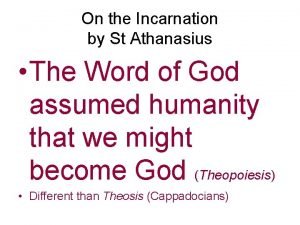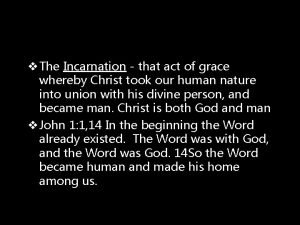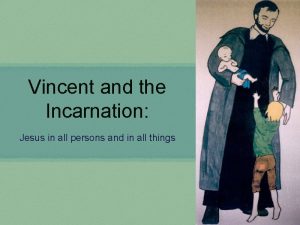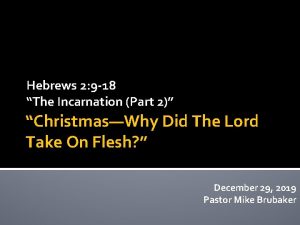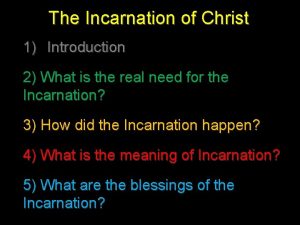What is the meaning of the Incarnation for
















- Slides: 16



What is the meaning of the Incarnation for us? All human beings search for meaning and purpose in their lives. Christians follow the way of Jesus, who is the exemplar and model for our life-quest. Jesus is ‘the way, and the truth, and the life’ (John 14: 6). We accept Jesus’ invitation, ‘Follow me’ (Matthew 4: 119).

What is the meaning of the Incarnation for us? Jesus is the Word of God. His words ‘are spirit and life’ (John 6: 63). Jesus embodies what has been revealed in and through creation. Jesus is the image of the invisible God (Colossians 1: 15). The more we come to know Jesus, the more we come to know ourselves and the person God created us to be. Theological Virtues empower and guide us in this quest.

What is the meaning of the Incarnation for us? THE QUEST FOR TRUTH: The quest for truth about ourselves is ultimately the quest for God, who is Truth. Theological Virtue of faith empowers us to make this quest successfully. THE QUEST FOR LOVE: The quest for love is the quest for God, who revealed himself to be love. In Jesus we see that our deepest desire to love and to be loved is central to our growth as children of God. Theological Virtue of love empowers us to make this quest successfully. Theological Virtue of hope assures us that God desires what is good and best for each and every person. What is the connection between truth, love and hope in a Christian’s becoming the person God created them to be?

Jesus: true God and true man At the heart of all Revelation and of the Catholic faith is a Person, Jesus Christ, who is both fully divine and fully human and who is worthy of our belief, adoration and love. St. John, toward the conclusion of his account of the Gospel, states his reason for writing: ‘so that you may come to believe that Jesus is the Messiah, the Son of God, and that through believing you may have life in his name’ (John 20: 31). Jesus is the ‘way’ that leads to life, both here on earth and life everlasting. The quest for that life is what drives every person.

The mysteries of Jesus’ life Jesus’ whole life, his Incarnation, Death, Resurrection and Ascension, is the Revelation that we are good but in need of salvation and that we are meant for eternal life. Jesus’ whole life is the Revelation of God saving us from the power of sin and death, reconciling us to himself, and restoring fallen humanity to our original vocation of holiness of life with God.

Infancy and early years of Jesus § Conception and birth § Magi and presentation in the Temple § Flight into Egypt and return to Nazareth § Finding in the Temple § Hidden life

Jesus’ public life and ministry The announcement of the Kingdom of God Baptism and Transfiguration The Messiah and his work The call of the Twelve The miracles of Jesus, the Teacher Final entry into Jerusalem Passion and glorification: Last days, Crucifixion and burial, and descent into Hell § Resurrection and Ascension § § § §

Characteristics of Jesus For Christians, Jesus reveals most clearly what it means to be ‘authentic’. Jesus lived to do his Father’s will. He was always true to being the Son of the Father and to fulfilling the mission the Father gave him. He did not base what he said and did on his desire to seek the acceptance or approval of people. He was always faithful to his identity. Even some of his enemies acknowledged that he was a person of his word.

Characteristics of Jesus All through the Gospels, we can feel the power of compassion at the heart of Jesus’ life; for example: § Jesus wept at the death of his friend Lazarus (John 11: 35); § Jesus comforted a widowed mother. Then he raised her son back to life again. (Luke 7: 1117); § Time and time again Jesus said to people, ‘Don’t cry’, ‘Don’t worry’, ‘Don’t be afraid’ Jesus is our exemplar and model for our own witnessing to God’s compassion for people. Has anyone ever treated you with compassion? How did you respond?

Jesus, true ‘friend’ Jesus helped his disciples to come to know the meaning of his life by calling them ‘friends’. Jesus’ friendship with his disciples is portrayed in his friendship with Mary, Martha and Lazarus. At the Last Supper, Jesus revealed the depth and nature of his friendship with his disciples; he prayed that his disciples would be one with him as he and the Father are one.

Jesus’ solidarity with the poor Jesus lived in solidarity with the poor and vulnerable. He brought God’s love and compassion to sinners and to the sick. By his actions Jesus revealed the universality of God’s love for all people and the true meaning of the Great commandment and the Ten Commandments. ‘The principal of solidarity. . . involves a love for all peoples that transcends national, racial, ethnic, economic, and ideological differences. It respects the needs of others and the common good in an interdependent world. ’ (USCCA, 529)

Jesus’ solidarity with the poor Jesus revealed that God lives in solidarity with all people. For example, God lives in solidarity with: § the spiritually poor § the economically poor and oppressed § the sick § women What people are marginalized and victimized in society today? Why and how are they marginalized?

St. Maria Goretti, virgin and martyr Maria Goretti (1890 -1902) is the patron saint of youth and victims of rape. Maria’s father died when she was nine and she and her mother shared the work on their farm with a count and his teenage son, Alessandro. Allesandro took advantage of the poverty of Maria and her family and demanded that Maria work for him. At first Alesandro verbally abused Maria but eventually he attempted to rape her. When Maria forcefully refused him, he stabbed her fourteen times. Maria survived for twenty hours before she died.

St. Maria Goretti, virgin and martyr During Maria’s dying hours she was asked if she forgave Alessandro. She replied, ‘Yes, for the love of Jesus I forgive him. I want him to be with me in paradise. ’ Alessandro was convicted and sentenced to thirty years in prison. During that time he had a vision of Maria. He repented and turned his life around. He visited Maria’s mother and asked for her forgiveness. In 1950 Pope Pius XII named Maria Goretti a saint, making her the youngest saint of the Church. Maria’s feast day is July 6. What does Maria Goretti’s life and death tell you about what it means to be truly human and a disciple of Jesus?
 Incarnation meaning
Incarnation meaning Incarnation community center
Incarnation community center St athanasius on the incarnation
St athanasius on the incarnation Kalki the last avatar
Kalki the last avatar Kontinuitetshantering i praktiken
Kontinuitetshantering i praktiken Typiska drag för en novell
Typiska drag för en novell Tack för att ni lyssnade bild
Tack för att ni lyssnade bild Ekologiskt fotavtryck
Ekologiskt fotavtryck Varför kallas perioden 1918-1939 för mellankrigstiden
Varför kallas perioden 1918-1939 för mellankrigstiden En lathund för arbete med kontinuitetshantering
En lathund för arbete med kontinuitetshantering Underlag för särskild löneskatt på pensionskostnader
Underlag för särskild löneskatt på pensionskostnader Personlig tidbok för yrkesförare
Personlig tidbok för yrkesförare Sura för anatom
Sura för anatom Vad är densitet
Vad är densitet Datorkunskap för nybörjare
Datorkunskap för nybörjare Boverket ka
Boverket ka Debattartikel struktur
Debattartikel struktur


